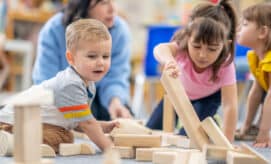During toddlerhood, young children are interested in moving their bodies, connecting with their peers, and finding new ways to assert their independence. This stage of development is all about exploration, as children discover how they relate to others and the world around them. As educators, we can use our understanding of toddler development to create an engaging, developmentally-appropriate curriculum and learning environment for the children in our care.
Toddler Development
During toddlerhood, children are growing and changing in new ways every day. During this stage of development, little ones develop strong preferences, find new ways to connect with others, and become increasingly eager to try new things.
Physical Development
As they begin walking, young children start to feel more confident in their bodies and are eager to try new skills. During this stage of development, they become stronger, faster, and more coordinated. In its website article outlining toddler development milestones, the North Shore University Health System describes the stops and starts of toddler physical development: “Toddlers will quickly master walking and move on to running, jumping and climbing. Around age two, most toddlers will be able to navigate stairs, kick or throw a ball and draw simple lines. During this time, children may still stumble frequently and be accident prone.”
Social-Emotional Development
Independence is a big part of toddlerhood. During this age, little ones are learning who they are, and how they fit into the world around them. At this stage, children start to have strong likes, dislikes, and preferences – and they begin to experiment with expressing their opinions.
At this age, young children also learn about relationship-building and friendship, as they connect with peers in new ways. ZERO TO THREE’s article on toddler social development explains, “Two-year-olds are (also) capable of empathy— understanding the feelings of others. You might see a child comfort a peer who is hurt or even cry when he sees another child who is upset. At the same time, toddlers still love to say ‘No!’ and struggle with resolving conflicts with friends. Children develop more advanced social play skills, such as sharing and turn-taking, over time as they near age 3 and beyond.”
Cognitive Development







